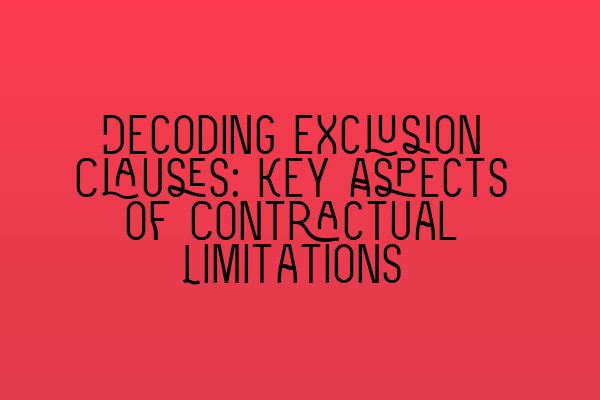Decoding Exclusion Clauses: Key Aspects of Contractual Limitations
Welcome to SQE Contract Law, where we provide you with valuable insights into various legal aspects. In this blog post, we will focus on decoding exclusion clauses and discuss key aspects of contractual limitations. Exclusion clauses play a crucial role in contracts, allowing parties to limit or exclude their liability for certain events or losses.
Understanding Exclusion Clauses
An exclusion clause is a provision in a contract that seeks to exclude or limit the liability of one or both parties in the event of a breach or other specified events. It is important to carefully draft and interpret exclusion clauses to ensure their enforceability and effectiveness.
One key aspect to consider when dealing with exclusion clauses is the incorporation of the clause into the contract. It is crucial to ensure that the clause is properly incorporated and forms part of the contract. This can be achieved by clearly stating the presence of the clause in the contract and drawing the attention of the parties to its existence and terms. The case of [RELATED ARTICLE: Unveiling Real-Life Case Studies: Insights into Legal Practice and Decision-Making] provides a real-life example of how the courts interpret and enforce exclusion clauses.
Another important consideration is the construction and interpretation of the exclusion clause. Courts tend to interpret exclusion clauses strictly and against the party seeking to rely on it. Ambiguities or uncertainty in the wording of the clause can lead to difficulties in enforcing it. It is advisable to seek legal advice in formulating clear and unambiguous exclusion clauses to avoid any potential challenges in court.
The Effectiveness of Exclusion Clauses
Exclusion clauses are not always effective, and their enforceability depends on various factors. One key factor is the reasonableness of the clause. The courts apply a reasonableness test to determine whether the exclusion clause is fair and reasonable in the circumstances. It is important for the clause to be reasonable in terms of its scope, the types of losses excluded, and the overall balance of the contract.
The case law surrounding the reasonableness of exclusion clauses is extensive, and it is crucial for solicitors to stay informed about recent developments in this area. Our article on [RELATED ARTICLE: Exploring Solicitor Salaries in the UK: Average Earnings and Factors Affecting Income] discusses the importance of continuous professional development and staying updated with legal developments.
Furthermore, the courts also consider the bargaining power of the parties when assessing the effectiveness of an exclusion clause. If one party has significantly more bargaining power than the other, the courts may be more inclined to scrutinize the clause and impose limitations on its enforceability.
Providing Certainty and Protection
Exclusion clauses are designed to provide certainty and protection for parties entering into contracts. They allow parties to allocate risks and liabilities in a way that meets their needs and objectives. However, it is vital to strike a balance between protecting one’s interests and ensuring fairness and reasonableness in contractual relationships.
As solicitors, it is our responsibility to guide our clients through the complexities of exclusion clauses and provide them with comprehensive advice on their rights and obligations. Our expertise in contract law allows us to assist clients in drafting, interpreting, and negotiating exclusion clauses to achieve their desired outcomes.
The importance of effective client relationship management cannot be understated in the legal profession. Our article on [RELATED ARTICLE: Mastering Client Relationship Management: Skills for Solicitors to Enhance Trust and Loyalty] highlights the significance of building strong relationships with clients to foster trust and loyalty.
In conclusion, understanding and decoding exclusion clauses is essential in contract law. Proper drafting, incorporation, construction, and reasonableness are key aspects that need to be carefully considered. By staying informed about recent case law and relying on legal expertise, solicitors can effectively navigate the complexities of exclusion clauses and provide their clients with the necessary guidance and protection needed.
If you would like further advice on exclusion clauses or any other legal matters, please do not hesitate to contact us for a consultation. And for those seeking a career in law, our article on [RELATED ARTICLE: Pursuing a Law School Education in the UK: Choosing the Right Path for Your Future] provides valuable insights into the different paths available.
Thank you for reading, and we look forward to assisting you with your legal needs.
